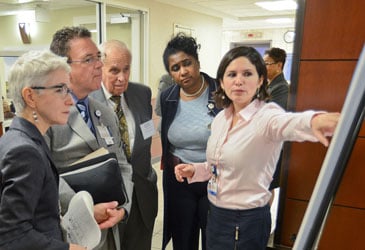I recently spent two days in Detroit at the Henry Ford Health System—and what I learned there is too exciting not to share. The system has hosted an annual Quality Exposition for 23 years, during which health care teams from throughout its integrated system demonstrate new ways to make patient care safe, patient-centered, timely, efficient, effective and equitable.
There were 88 projects in all, and each one solved a problem or a challenge to providing high-quality care.
Some projects were simple but produced profound results, such as improving antimicrobial management by using a physician assistant instead of a physician to do screening and triage work. This saves money, gives the physician more time to treat patients and improves health outcomes.
Some projects were diversity-focused, including one that put trained community health workers in Detroit clinics to improve outcomes around diabetes. Other projects were tech-focused, such as a project that improved acquisition of oncology drugs for cancer patients by using electronic health records.
All of these projects were of the highest caliber, carried out by small teams using very scientific, evidence-based approaches and measures.
I was impressed with the pride and enthusiasm evident in every participant. These are people who take ownership in their work to improve patient outcomes and quality of care. The energy is infectious.
The leadership support was tremendous as well: From the CEO down through the system, everyone associated with the Henry Ford Health System clearly supported the projects and encouraged innovation in the way they delivered care. The system’s leaders recognize the value of this work because, at the end of the day, it improves the care they’re able to provide patients.
Henry Ford’s model shows initiative, consistency and commitment, and it’s a model that any hospital system and most medical practices can use to advance health care quality in their own settings.
At the AMA, we’re encouraging innovation in similar ways. Our Improving Health Outcomes initiative is seeking to reduce the incidence of hypertension and type 2 diabetes. The quality projects like those coming out of Henry Ford are important components of making changes within the community that will lead to stronger outcomes around these two chronic diseases.
 We also know from our Professional Satisfaction and Practice Sustainability initiative that physicians are most satisfied when they are able to provide high-quality care to their patients. The advancements coming out of Henry Ford likely will contribute to physicians being able to do just that.
We also know from our Professional Satisfaction and Practice Sustainability initiative that physicians are most satisfied when they are able to provide high-quality care to their patients. The advancements coming out of Henry Ford likely will contribute to physicians being able to do just that.
I’m looking forward to seeing the continued care improvements from these projects and hope more health systems commit to helping physicians take leadership in developing new ways to deliver high-quality patient care.





